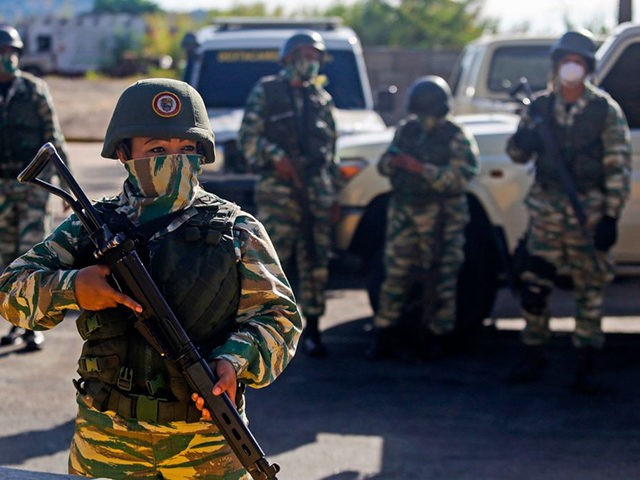Hundreds of members of the Yukpa indigenous group of Venezuela traveled across the country from their native Zulia state to Caracas, arriving on Wednesday seeking a meeting with socialist dictator Nicolás Maduro but found his repressive police force greeting them, instead.
Yukpa leaders said they made the trip to protest the increasingly dire situation of their people in the face of Venezuela’s economic collapse under socialism and Maduro’s poor handling of the Chinese coronavirus pandemic. The protesters sought a meeting with Maduro to demand better access to food, water, health care, and education, reports detailed.
Maduro did not explicitly deny their request for a meeting, but deployed members of the Bolivarian National Guard (GNB) to meet the protesters, who reached the Caracas zone immediately outside of Maduro’s Miraflores presidential palace, which he has occupied illegally since January 2019. The GNB has notoriously repressed nearly every type of protest against Maduro since he took power in 2013, beating, torturing, killing, and allegedly raping peaceful protesters.
Maduro and his socialist predecessor, Hugo Chávez, have for years claimed to be champions of the rights of indigenous Venezuelans, establishing bureaucracies within the government allegedly to address indigenous affairs, assigning indigenous people new holidays, and destroying statues of European icons like Christopher Columbus. Socialism has faced years of intense rejection from the indigenous population in the country, however, which consists of a wide variety of ethnic groups, most in the nation’s west and south into the Amazon Rainforest.
Confrontation on Wednesday night outside of Miraflores reportedly resulted in at least four Yukpa protesters injured and one GNB injured in a bow and arrow attack, presumably by the indigenous protesters. Some reports claim the indigenous group has denied the arrow injury. At press time, the group remains in Caracas demanding access to Maduro, having slept on the sidewalk on Wednesday night. Caracas’ streets are considered some of the world’s most dangerous due to high rates of robbery, assault, and attacks by roving socialist gangs (colectivos).
The Spanish newswire service EFE reported that about 300 members of the Yukpa group traveled from Zulia, the westernmost state of the country along with Táchira to its south, to the far-east capital of Caracas, a voyage of about 500 miles. They reportedly got within 400 feet of Miraflores before Maduro’s police attacked. Shortly before the attack, indigenous leaders said that they had been able to speak to Minister of Education Aristóbulo Istúriz but that they did not feel satisfied that he allowed them to address their issues.
Following that meeting, police reportedly pushed the crowd back to prevent them from getting near the presidential estate. They also denied access to the leader of the Yukpa people, the cacica Sandra Peñaranda.
Peñaranda published a voice memo on the messaging application Whatsapp explaining the situation late on Wednesday.
“We came to demand our rights here in Caracas, since they don’t take us into account over there [in Zulia], it is as if we were forgotten,” the audio reportedly said. “So we want the president himself to tend to us because that’s enough of the Ministry of Indigenous Peoples deceiving us.”
“The guards here have mistreated us, they are wearing uniforms, and, well, a woman was assaulted, she was sent to the hospital already [but] did not receive medication,” Peñaranda confirmed.
The Ministry of Indigenous Peoples is a socialist bureaucratic agency meant to work as a liaison between the president and the leaders of the many ethnic groups in rural Venezuela, which nominally operate autonomously from the capital.
Peñaranda specifically mentioned the overflowing of several rivers in October 2019 that killed seven children and left hundreds of Yukpas with no homes or belongings, protesting that Maduro’s regime never offered any federal aid in response to that natural disaster. The Yukpas have not made any statements specifically condemning socialism or the Maduro regime’s illegitimacy in power, instead merely asking for the government to perform its duties in Zulia. Peñaranda describes Maduro as the “son of our Eternal Commander,” using the official title that the late Chávez still boasts.
Journalists on the ground in Caracas reported that the crowd Peñaranda led met with violent resistance once they reached an area close to the presidential palace; the outlet Efecto Cocuyo claimed that some have disputed the claim. No photographic or video evidence has surfaced of the event at press time, though recording any violence in the dark of night would present a challenge, as proven by the poor quality of the photos and videos that have surfaced.
The Maduro regime has not confirmed any injuries, though two independent journalists reported separately that they had information that at least one GNB officer was shot with a bow and arrow. At least one of the four Yukpa people injured was “run over,” local media reported, though her injuries also resulted in dispute; the Venezuelan outlet El Pitazo claimed to have made contact with a witness who said a GNB office beat the woman while she was holding a baby.

COMMENTS
Please let us know if you're having issues with commenting.